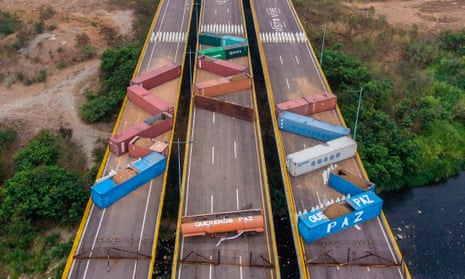The Red Cross has brokered a deal with representatives of Venezuela’s embattled leader, Nicolás Maduro, and his rival, Juan Guaidó, to allow humanitarian aid into the country, indicating a seldom-seen middle ground between the two men that contest the presidency.
The first shipment of aid for about 650,000 vulnerable people could reach Venezuela in two weeks, Francesco Rocca, the president of the International Federation of the Red Cross, told a press conference on Friday.
“This is an operation similar to what’s going in Syria, in terms of the amount of people that will be attended,” Rocca said. “This obviously will not resolve the problems in Venezuela – and nobody should assume this is a complete solution.”
The shipment will include medical equipment, surgical kits and power generators – which are desperately needed as Venezuela grapples with devastating blackouts.
The operation once again puts humanitarian aid at the centre of the battle for power in Venezuela, following Guaidó’s failed attempt to unilaterally bring US-supported aid into the country last month.
Venezuela has been mired in an economic, political and humanitarian crisis for five years. Shortages and hyperinflation - set to reach 10m% this year – have made medicines and even basic foodstuff hard to obtain for most people.
The average Venezuelan has lost 10kg in weight, according to Caritas, a Catholic humanitarian organisation, while 3 million people have fled.
Venezuela’s embattled president Nicolás Maduro has long denied the existence of a humanitarian crisis, and on 23 February blocked an effort led by Guaidó to bring aid into the country.
That day, violence erupted on Venezuela’s borders with Brazil and Colombia. Opposition supporters clashed with security forces, while some of the trucks carrying the food and medical supplies were burned in circumstances that remain unclear. Most of the trucks were turned around and little aid entered Venezuela.
Maduro portrayed the aid as a prelude to a foreign intervention, while his vice-president, Delcy Rodríguez, described the packages as “cancerous”.
The new effort seems more likely to succeed in large part because of the involvement of the Red Cross, which had distanced itself from the previous attempt to shift the aid into Venezuela.
“Today’s Red Cross development is clear evidence that independent shuttle diplomacy and separate negotiations with Maduro and the opposition can pay off in Venezuela,” tweeted Geoff Ramsey, a Venezuela analyst at the Washington Office on Latin America.
Rocca stressed that the delivery of aid must remain “independent, neutral, impartial and unhindered”.
Guaidó, speaking in a video posted to Twitter on Friday morning, was quick to seize the announcement as a win, claiming a “great victory in our struggle”.
Maduro has not yet made an announcement on the new aid delivery.
